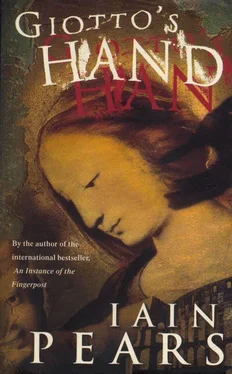Iain Pears - Giotto's Hand
Здесь есть возможность читать онлайн «Iain Pears - Giotto's Hand» весь текст электронной книги совершенно бесплатно (целиком полную версию без сокращений). В некоторых случаях можно слушать аудио, скачать через торрент в формате fb2 и присутствует краткое содержание. Город: London, Год выпуска: 1994, ISBN: 1994, Издательство: Harper Collins, Жанр: Исторический детектив, на английском языке. Описание произведения, (предисловие) а так же отзывы посетителей доступны на портале библиотеки ЛибКат.
- Название:Giotto's Hand
- Автор:
- Издательство:Harper Collins
- Жанр:
- Год:1994
- Город:London
- ISBN:978-0-00-232531-8
- Рейтинг книги:5 / 5. Голосов: 1
-
Избранное:Добавить в избранное
- Отзывы:
-
Ваша оценка:
- 100
- 1
- 2
- 3
- 4
- 5
Giotto's Hand: краткое содержание, описание и аннотация
Предлагаем к чтению аннотацию, описание, краткое содержание или предисловие (зависит от того, что написал сам автор книги «Giotto's Hand»). Если вы не нашли необходимую информацию о книге — напишите в комментариях, мы постараемся отыскать её.
Giotto's Hand — читать онлайн бесплатно полную книгу (весь текст) целиком
Ниже представлен текст книги, разбитый по страницам. Система сохранения места последней прочитанной страницы, позволяет с удобством читать онлайн бесплатно книгу «Giotto's Hand», без необходимости каждый раз заново искать на чём Вы остановились. Поставьте закладку, и сможете в любой момент перейти на страницу, на которой закончили чтение.
Интервал:
Закладка:
“And Forster?”
“He was a piece of scum,” she said thoughtfully, the words contrasting strangely with the soft and melodious voice. “He got Fancelli pregnant and left her. Not him, says he. The girl was a slut. Could have been anyone. The Stragas said that if della Quercia was going to continue associating with them, Fancelli would have to go. Primitive, intolerant times. I felt for her. My own origins weren’t so much more respectable.
“So she was out on her ear. I was appalled. If no one else was going to help her, I would. I’d been sent to Italy to find a husband to get me off their hands. I didn’t want to go to a finishing school to find a husband, for God’s sake. I wanted to look after myself.
“I didn’t have any money to give Fancelli, so I thought it only fair that the Stragas should provide it. They all trooped off to Mass on Sunday at ten on the dot. There was always a side door left open so lunch could be delivered. I slipped in, took the picture and left.
“It was so easy,” she said with a tone of fond nostalgia. “I don’t think they even noticed it had gone for a couple of days. The next stage was to slip it off to an old friend of my mother who sold it. Again, very easy.
“So Forster didn’t take it? That stuff Fancelli said was just lies?”
“He took her to Switzerland, and delivered the parcel for me. I had very carefully sealed it up. He, of course, simply opened it. I gave him some money to shut him up, and the rest to Fancelli. I paid for her to have her kid, just as I’m paying now for her to die. I liked her. So she was prepared to help me.”
“And Forster didn’t try to blackmail you then?”
“He couldn’t. It would have been my word against his. Getting rid of him then was very simple. The whole thing was simple, in fact. As far as I was concerned, what I got out of the Straga episode was the knowledge that stealing paintings is a cinch, if you know what you’re doing. One other lesson: I had a natural alibi. When my thefts were discovered, the police always looked for a man. ‘He must have got in through…’; ‘‘He took the picture off the wall…’ I knew it would never occur to them that a woman was responsible unless I made a bad mistake. I very much regret the feminist movement, you know. It made life more difficult.
“So I went on. The first few solved my financial woes for a while. I came back to England, married Verney and retired. Then the bastard left me with the kids to support. So I decided that full-time art theft was as good an option as any. I learned about art history until the money ran out, worked at an auction house and an insurance company or two as a secretary, slowly built up contacts and got to know Winterton, who I spotted as someone who was unscrupulous, ambitious and—this may sound odd—entirely trustworthy.
“After four years’ patient research, I was ready. I had detailed breakdowns of the whereabouts of paintings in a dozen houses, as well as plans of such security systems as existed and knew which ones had been photographed. It was then merely a question of picking them off, one by one.”
“How much did you get?”
“I was doing quite nicely by then. The art market was going up, of course. Between 1971 and 1975, I netted nearly $600,000; ’75 to ’80, over a million. From then on, I worked to commission, when a specific client had been lined up—and had paid—in advance. One intermediary, who never came into personal contact with the clients either, no assistants. Always smallish paintings, nothing I couldn’t carry easily myself. And I was always very, very careful. If I didn’t like the prospects, I’d hand the money back. And I always insisted on the painting going into hiding for a couple of years so it wouldn’t pop up until the police had stopped looking.”
“Fra Angelico?”
“My only failure and the reason we are sitting here now. I’d got into the house by working as a cleaning lady—a useful way of doing it, by the way. So, of course, I had to stay on afterwards for several months: it would have been too obvious to have disappeared. That was why I had to use that idiot Sandano to get the thing out of the country. Bad mistake. I’d not approached him directly, of course, so there was no danger, but I lost the picture.”
“The Milan Vélasquez?”
“I had to do that, because I’d already been paid for the Fra Angelico. It went wrong, so I offered them an alternative. They insisted on the Vélasquez. I wasn’t happy, because I knew a print had been made which could identify it; it was too well-known for my normal way of doing things. But I wanted the contract off my hands and I wanted to retire. I’m getting much too old for this sort of work. But I insisted it went out of circulation for a couple of years before delivery. When I got Weller, I decided it was a perfect place to put it.”
“Why? Wasn’t that asking for trouble?”
“I had to put it somewhere, and there’s no bigger giveaway than stashing these things in safe deposit boxes. I know bankers aren’t meant to peek. But I did not intend to trust my continued liberty to the promise of a banker. Besides, once I’d hidden the documentation, stuck it in an appropriate frame and dirtied it up, it looked quite convincing. Then I called in the morons from the auction house. They swept through in about half an hour—for which they charged an outrageous sum—and scarcely gave it a second glance.
“So for export purposes I now have certificates from English Heritage, the auctioneers and the Inland Revenue itself saying it is a mock-Kneller scarcely worth £500 due to its poor condition. Perfect. That’s the great virtue of experts: people believe them. But my worries were right. There was a print, and you recognized the picture from it. Even though you did take some time over it.”
“So what happened with Forster?” Argyll asked, brushing aside the criticism of his abilities. “What did he have on you?”
“His account of Florence, documents on the Pollaiuolo and a fair smattering of stuff he’d picked up from comparing auction house records and inventories here. I mean, he couldn’t prove anything about Veronica’s death, but there was enough to link me positively with two thefts. And once an investigation starts… So he wanted me to buy them back.”
“And you killed him instead?”
Mary looked sad that he should have such a low opinion of her. “No, I agreed,” she said reproachfully. “I don’t make a habit of killing people, you know. I agreed. And every time I agreed, he upped the price. I got a million for the picture, with another million on delivery in a month or so. Bargain basement, but what the hell. Forster wanted three million for his grubby bits of paper. He pushed me further than I could go. That was when I lost patience. I went to Fancelli and sent Winterton to Sandano. The police took the bait, you turned up, Forster got his evidence.”
“And you got Forster. Dear God.” Argyll rubbed his face in his hands, and closed his eyes as he digested all this information and realized the enormity of his mistake.
“I’m so sorry, Jonathan,” she said gently. “You must be feeling very badly used. And I can’t blame you. I’ve grown quite fond of you in the past few days; I would much rather it had ended in a different way. But what could I do? You can’t expect me to go to jail just because I like you?”
Argyll nodded silently. He didn’t really know what he thought at the moment.
Mary Verney continued to regard him with what seemed very like genuine sympathy and affection. “The thing is, what are you going to do?”
“Hmm?”
“Be the straight arrow, as our American friends say? Go to Flavia, and tell her what you know? I’m not going to leap at you with an axe or anything, if that’s what you’re worried about. There is a difference, you know. Between you and them.”
Читать дальшеИнтервал:
Закладка:
Похожие книги на «Giotto's Hand»
Представляем Вашему вниманию похожие книги на «Giotto's Hand» списком для выбора. Мы отобрали схожую по названию и смыслу литературу в надежде предоставить читателям больше вариантов отыскать новые, интересные, ещё непрочитанные произведения.
Обсуждение, отзывы о книге «Giotto's Hand» и просто собственные мнения читателей. Оставьте ваши комментарии, напишите, что Вы думаете о произведении, его смысле или главных героях. Укажите что конкретно понравилось, а что нет, и почему Вы так считаете.












